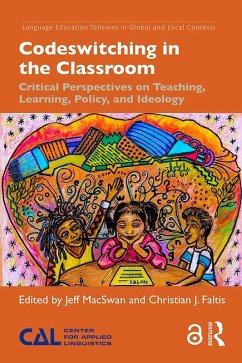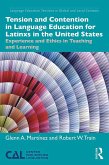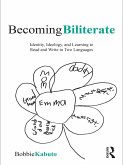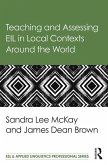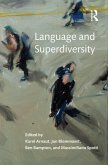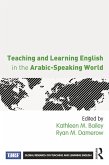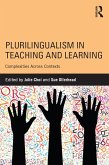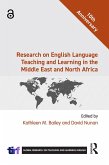Codeswitching in the Classroom (eBook, PDF)
Critical Perspectives on Teaching, Learning, Policy, and Ideology
Redaktion: Macswan, Jeff; Faltis, Christian J.
0,00 €
0,00 €
inkl. MwSt.
Sofort per Download lieferbar

0 °P sammeln
0,00 €
Als Download kaufen

0,00 €
inkl. MwSt.
Sofort per Download lieferbar

0 °P sammeln
Jetzt verschenken
Alle Infos zum eBook verschenken
0,00 €
inkl. MwSt.
Sofort per Download lieferbar
Alle Infos zum eBook verschenken

0 °P sammeln
Codeswitching in the Classroom (eBook, PDF)
Critical Perspectives on Teaching, Learning, Policy, and Ideology
Redaktion: Macswan, Jeff; Faltis, Christian J.
- Format: PDF
- Merkliste
- Auf die Merkliste
- Bewerten Bewerten
- Teilen
- Produkt teilen
- Produkterinnerung
- Produkterinnerung

Bitte loggen Sie sich zunächst in Ihr Kundenkonto ein oder registrieren Sie sich bei
bücher.de, um das eBook-Abo tolino select nutzen zu können.
Hier können Sie sich einloggen
Hier können Sie sich einloggen
Sie sind bereits eingeloggt. Klicken Sie auf 2. tolino select Abo, um fortzufahren.

Bitte loggen Sie sich zunächst in Ihr Kundenkonto ein oder registrieren Sie sich bei bücher.de, um das eBook-Abo tolino select nutzen zu können.
Bringing together sociolinguistic, linguistic, and educational perspectives, this cutting-edge overview of codeswitching examines language mixing in teaching and learning in bilingual classrooms.
- Geräte: PC
- ohne Kopierschutz
- eBook Hilfe
- Größe: 7.66MB
Andere Kunden interessierten sich auch für
![Tension and Contention in Language Education for Latinxs in the United States (eBook, PDF) Tension and Contention in Language Education for Latinxs in the United States (eBook, PDF)]() Glenn A. MartínezTension and Contention in Language Education for Latinxs in the United States (eBook, PDF)42,95 €
Glenn A. MartínezTension and Contention in Language Education for Latinxs in the United States (eBook, PDF)42,95 €![Becoming Biliterate (eBook, PDF) Becoming Biliterate (eBook, PDF)]() Bobbie KabutoBecoming Biliterate (eBook, PDF)46,95 €
Bobbie KabutoBecoming Biliterate (eBook, PDF)46,95 €![Teaching and Assessing EIL in Local Contexts Around the World (eBook, PDF) Teaching and Assessing EIL in Local Contexts Around the World (eBook, PDF)]() Sandra Lee MckayTeaching and Assessing EIL in Local Contexts Around the World (eBook, PDF)54,95 €
Sandra Lee MckayTeaching and Assessing EIL in Local Contexts Around the World (eBook, PDF)54,95 €![Language and Superdiversity (eBook, PDF) Language and Superdiversity (eBook, PDF)]() Language and Superdiversity (eBook, PDF)49,95 €
Language and Superdiversity (eBook, PDF)49,95 €![Teaching and Learning English in the Arabic-Speaking World (eBook, PDF) Teaching and Learning English in the Arabic-Speaking World (eBook, PDF)]() Teaching and Learning English in the Arabic-Speaking World (eBook, PDF)51,95 €
Teaching and Learning English in the Arabic-Speaking World (eBook, PDF)51,95 €![Plurilingualism in Teaching and Learning (eBook, PDF) Plurilingualism in Teaching and Learning (eBook, PDF)]() Plurilingualism in Teaching and Learning (eBook, PDF)49,95 €
Plurilingualism in Teaching and Learning (eBook, PDF)49,95 €![Research on English Language Teaching and Learning in the Middle East and North Africa (eBook, PDF) Research on English Language Teaching and Learning in the Middle East and North Africa (eBook, PDF)]() Research on English Language Teaching and Learning in the Middle East and North Africa (eBook, PDF)42,95 €
Research on English Language Teaching and Learning in the Middle East and North Africa (eBook, PDF)42,95 €-
-
-
Bringing together sociolinguistic, linguistic, and educational perspectives, this cutting-edge overview of codeswitching examines language mixing in teaching and learning in bilingual classrooms.
Dieser Download kann aus rechtlichen Gründen nur mit Rechnungsadresse in A, B, BG, CY, CZ, D, DK, EW, E, FIN, F, GR, HR, H, IRL, I, LT, L, LR, M, NL, PL, P, R, S, SLO, SK ausgeliefert werden.
Produktdetails
- Produktdetails
- Verlag: Taylor & Francis eBooks
- Seitenzahl: 310
- Erscheinungstermin: 16. Oktober 2019
- Englisch
- ISBN-13: 9781315401096
- Artikelnr.: 57923322
- Verlag: Taylor & Francis eBooks
- Seitenzahl: 310
- Erscheinungstermin: 16. Oktober 2019
- Englisch
- ISBN-13: 9781315401096
- Artikelnr.: 57923322
- Herstellerkennzeichnung Die Herstellerinformationen sind derzeit nicht verfügbar.
Jeff MacSwan is Professor of Applied Linguistics and Language Education at the University of Maryland, USA. Christian J. Faltis is Professor of Teaching and Learning at the Ohio State University, USA.
Preface
Jeff MacSwan, University of Maryland; Christian J. Faltis, Ohio State
University
Part I. Theory and Context
1. Sociolinguistic and Linguistic Foundations of Codeswitching Research
Jeff MacSwan, University of Maryland
2. Pedagogical Codeswitching and Translanguaging in Bilingual Schooling
Contexts: Critical Practices for Bilingual Teacher Education
Christian J. Faltis, Ohio State University
Part II. Teaching and Learning
3. Exploring the Pedagogical Potential of Translanguaging in Peer
Reading Interaction
Johanna Tigert, University of Massachusetts Lowell; James Groff,
Melinda Martin-Beltrán, Megan Madigan Peercy, University of Maryland;
Rebecca Silverman, Stanford University
4. Codeswitching and mathematics learners: How hybrid language practices
provide resources for student participation in mathematical practices
Judit Moschkovich, University of California, Santa Cruz
5. Sandwiching, Polylanguaging, Translanguaging, and Codeswitching:
Challenging Monolingual Dogma in Institutionalized Language Teaching
Guadalupe Valdés, Stanford University
6. Effects of Home Codeswitching Practices on Bilingual Language
Acquisition
Jeff MacSwan, University of Maryland; Natalia Guzman, University of
Maryland; Kara McAlister, Arizona State University; and Margaret
Marcus, University of Maryland
7. Young Emergent Bilinguals' Languaging Practices in Story Retelling
Mileidis Gort, CU Boulder
Part III. Policy and Ideology
8. ¿Qué quieren de mi? Examining elementary school teachers' belief
systems about language use in the classroom
Susan Hopewell, Lucinda Soltero-González, Kathy Escamilla, Jody
Slavick
9. Translanguaging in the Classroom: Implications for Effective Pedagogy
for Bilingual Youth in Texas
Kathryn Henderson, University of Texas at San Antonio; and Peter
Sayer, Ohio State University
10. Chicanx and Latinx Students' Linguistic Repertoires: Moving Beyond
Essentialist and Prescriptivist Perspectives
Ramón A. Martínez, Stanford University; Danny C. Martinez, University
of California, Davis
11. "You're not a Spanish-speaker!" - "We are all bilingual." The purple
kids on being and becoming bilingual in a dual language kindergarten
classroom
Deborah Palmer, University of Colorado, Boulder
Afterword: On Contested Theories and the Value and Limitations of Pure
Critique
Terrance G. Wiley, Arizona State University
Jeff MacSwan, University of Maryland; Christian J. Faltis, Ohio State
University
Part I. Theory and Context
1. Sociolinguistic and Linguistic Foundations of Codeswitching Research
Jeff MacSwan, University of Maryland
2. Pedagogical Codeswitching and Translanguaging in Bilingual Schooling
Contexts: Critical Practices for Bilingual Teacher Education
Christian J. Faltis, Ohio State University
Part II. Teaching and Learning
3. Exploring the Pedagogical Potential of Translanguaging in Peer
Reading Interaction
Johanna Tigert, University of Massachusetts Lowell; James Groff,
Melinda Martin-Beltrán, Megan Madigan Peercy, University of Maryland;
Rebecca Silverman, Stanford University
4. Codeswitching and mathematics learners: How hybrid language practices
provide resources for student participation in mathematical practices
Judit Moschkovich, University of California, Santa Cruz
5. Sandwiching, Polylanguaging, Translanguaging, and Codeswitching:
Challenging Monolingual Dogma in Institutionalized Language Teaching
Guadalupe Valdés, Stanford University
6. Effects of Home Codeswitching Practices on Bilingual Language
Acquisition
Jeff MacSwan, University of Maryland; Natalia Guzman, University of
Maryland; Kara McAlister, Arizona State University; and Margaret
Marcus, University of Maryland
7. Young Emergent Bilinguals' Languaging Practices in Story Retelling
Mileidis Gort, CU Boulder
Part III. Policy and Ideology
8. ¿Qué quieren de mi? Examining elementary school teachers' belief
systems about language use in the classroom
Susan Hopewell, Lucinda Soltero-González, Kathy Escamilla, Jody
Slavick
9. Translanguaging in the Classroom: Implications for Effective Pedagogy
for Bilingual Youth in Texas
Kathryn Henderson, University of Texas at San Antonio; and Peter
Sayer, Ohio State University
10. Chicanx and Latinx Students' Linguistic Repertoires: Moving Beyond
Essentialist and Prescriptivist Perspectives
Ramón A. Martínez, Stanford University; Danny C. Martinez, University
of California, Davis
11. "You're not a Spanish-speaker!" - "We are all bilingual." The purple
kids on being and becoming bilingual in a dual language kindergarten
classroom
Deborah Palmer, University of Colorado, Boulder
Afterword: On Contested Theories and the Value and Limitations of Pure
Critique
Terrance G. Wiley, Arizona State University
Preface
Jeff MacSwan, University of Maryland; Christian J. Faltis, Ohio State
University
Part I. Theory and Context
1. Sociolinguistic and Linguistic Foundations of Codeswitching Research
Jeff MacSwan, University of Maryland
2. Pedagogical Codeswitching and Translanguaging in Bilingual Schooling
Contexts: Critical Practices for Bilingual Teacher Education
Christian J. Faltis, Ohio State University
Part II. Teaching and Learning
3. Exploring the Pedagogical Potential of Translanguaging in Peer
Reading Interaction
Johanna Tigert, University of Massachusetts Lowell; James Groff,
Melinda Martin-Beltrán, Megan Madigan Peercy, University of Maryland;
Rebecca Silverman, Stanford University
4. Codeswitching and mathematics learners: How hybrid language practices
provide resources for student participation in mathematical practices
Judit Moschkovich, University of California, Santa Cruz
5. Sandwiching, Polylanguaging, Translanguaging, and Codeswitching:
Challenging Monolingual Dogma in Institutionalized Language Teaching
Guadalupe Valdés, Stanford University
6. Effects of Home Codeswitching Practices on Bilingual Language
Acquisition
Jeff MacSwan, University of Maryland; Natalia Guzman, University of
Maryland; Kara McAlister, Arizona State University; and Margaret
Marcus, University of Maryland
7. Young Emergent Bilinguals' Languaging Practices in Story Retelling
Mileidis Gort, CU Boulder
Part III. Policy and Ideology
8. ¿Qué quieren de mi? Examining elementary school teachers' belief
systems about language use in the classroom
Susan Hopewell, Lucinda Soltero-González, Kathy Escamilla, Jody
Slavick
9. Translanguaging in the Classroom: Implications for Effective Pedagogy
for Bilingual Youth in Texas
Kathryn Henderson, University of Texas at San Antonio; and Peter
Sayer, Ohio State University
10. Chicanx and Latinx Students' Linguistic Repertoires: Moving Beyond
Essentialist and Prescriptivist Perspectives
Ramón A. Martínez, Stanford University; Danny C. Martinez, University
of California, Davis
11. "You're not a Spanish-speaker!" - "We are all bilingual." The purple
kids on being and becoming bilingual in a dual language kindergarten
classroom
Deborah Palmer, University of Colorado, Boulder
Afterword: On Contested Theories and the Value and Limitations of Pure
Critique
Terrance G. Wiley, Arizona State University
Jeff MacSwan, University of Maryland; Christian J. Faltis, Ohio State
University
Part I. Theory and Context
1. Sociolinguistic and Linguistic Foundations of Codeswitching Research
Jeff MacSwan, University of Maryland
2. Pedagogical Codeswitching and Translanguaging in Bilingual Schooling
Contexts: Critical Practices for Bilingual Teacher Education
Christian J. Faltis, Ohio State University
Part II. Teaching and Learning
3. Exploring the Pedagogical Potential of Translanguaging in Peer
Reading Interaction
Johanna Tigert, University of Massachusetts Lowell; James Groff,
Melinda Martin-Beltrán, Megan Madigan Peercy, University of Maryland;
Rebecca Silverman, Stanford University
4. Codeswitching and mathematics learners: How hybrid language practices
provide resources for student participation in mathematical practices
Judit Moschkovich, University of California, Santa Cruz
5. Sandwiching, Polylanguaging, Translanguaging, and Codeswitching:
Challenging Monolingual Dogma in Institutionalized Language Teaching
Guadalupe Valdés, Stanford University
6. Effects of Home Codeswitching Practices on Bilingual Language
Acquisition
Jeff MacSwan, University of Maryland; Natalia Guzman, University of
Maryland; Kara McAlister, Arizona State University; and Margaret
Marcus, University of Maryland
7. Young Emergent Bilinguals' Languaging Practices in Story Retelling
Mileidis Gort, CU Boulder
Part III. Policy and Ideology
8. ¿Qué quieren de mi? Examining elementary school teachers' belief
systems about language use in the classroom
Susan Hopewell, Lucinda Soltero-González, Kathy Escamilla, Jody
Slavick
9. Translanguaging in the Classroom: Implications for Effective Pedagogy
for Bilingual Youth in Texas
Kathryn Henderson, University of Texas at San Antonio; and Peter
Sayer, Ohio State University
10. Chicanx and Latinx Students' Linguistic Repertoires: Moving Beyond
Essentialist and Prescriptivist Perspectives
Ramón A. Martínez, Stanford University; Danny C. Martinez, University
of California, Davis
11. "You're not a Spanish-speaker!" - "We are all bilingual." The purple
kids on being and becoming bilingual in a dual language kindergarten
classroom
Deborah Palmer, University of Colorado, Boulder
Afterword: On Contested Theories and the Value and Limitations of Pure
Critique
Terrance G. Wiley, Arizona State University
